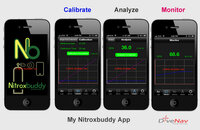What is an el cheapo?
The "el cheapo" is basically all of the parts that you need to make an O2 analyzer yourself with step by step instructions and it saves you a lot of money.
But before that, I have to applaud you for posting this thread. If you really do have "0-24 dives," I am very impressed that you are already looking into incident reports and are looking for ways to be a safer diver. Your instructor should be proud!
I have been diving for about 5 years now and have gotten a lot of cylinders from different shops. So far, I have not heard of anyone I knew personally that breathed the wrong gas on a recreational level. In technical diving, which is what you read about, most accidents occur from switching to the wrong gas. It is uncommon for a tec diver to unknowingly have the wrong mixture of gas...because one of the first principles is analyze and immediately mark!
Analyzing your gas before you breathe is just safer diving. It is actually a good habit to get into. Like Dr. Lecter said, carbon monoxide is also a potential hazard. More so if you are getting fills from 3rd world countries or compressors that are near boats/cars. I remember reading a thread on here where one diver found lethal levels of CO in a cylinder he got. To answer your question no, you don't really need to be paranoid because these things are very uncommon. But if you have the means and finances to get these analyzers, it wouldn't be a bad idea.




